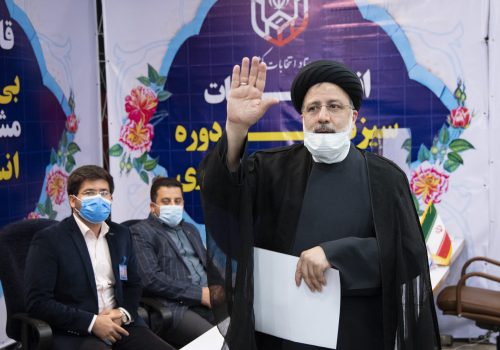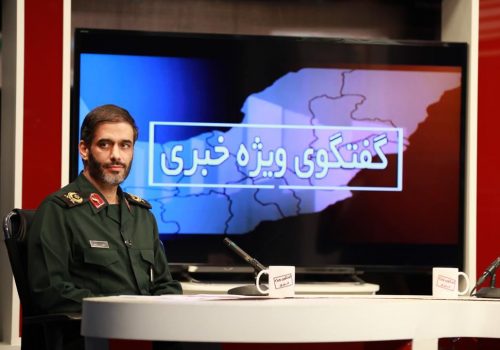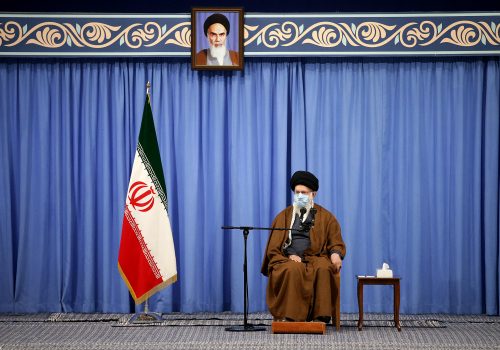‘Elections without Mohsen Rezaei are like kebabs without onions’
A perpetual candidate, a man who never leaves the scene, an election-addict, and a resilient politician: these are among the kinder ways in which Iranians describe Mohsen Rezaei.
Like Harold Stassen, a former Minnesota governor who ran unsuccessfully for US president nine times, Rezaei, a former commander of the Islamic Revolutionary Guards Corps (IRGC) and current Secretary of the Expediency Council—tasked with resolving the disputes between parliament and the Guardian Council—appears incapable of not putting himself forward as a candidate in Iran’s presidential elections.
Rezaei first ran unsuccessfully in 2005, then again in 2009 and 2013. This year, the former IRGC chief registered for the June election on May 15, the last day allowed.
His previous failed attempts and continued interest have sparked jokes and jibes from Iranians on social media, who even put him at the bottom of the heap in elections in other countries.
When he first ran for president in 2005, his slogan was the “government of love.” But he withdrew two days before the elections when it was clear that he would lose. At the time, the conservative camp urged competing candidates to withdraw in favor of Ali Larijani, who had no role at the time. However, only Rezaei dropped out and the vote was split among Larijani, then Tehran Mayor Mohammad Baqer Qalibaf, and former Tehran Mayor Mahmoud Ahmadinejad, who came in second to former president Ali Akbar Hashemi Rafsanjani, before beating him in a second round. Larijani, who is running again this year but as a moderate this time, came in sixth in 2005 with only 5.8 percent of the votes.
Rezaei learned a lesson from that experience and decided to stay until the end in each competition from then onward. So he tried again four years later in the controversial 2009 presidential elections that prompted the post-election protests known as the Green Movement. Rezaei received less than seven hundred thousand votes out of a total of thirty-nine million. Shocked by the results, he joined reformists Mir Hossein Mousavi and Mehdi Karroubi in casting doubt on the fairness of the official totals but eventually decided to pull back his complaint (Mousavi and Karroubi did not, led Green Movement protests, and have remained under house arrest since 2011).
Four years later in 2013, Rezaei was back again. Activists circulated what they called the “Mohsen Rezaei’s Survival Norm” on social networking websites. “Mohsen Rezaei will not disappear, but will move from one election to another,” the rule said.
During the 2013 election, the veteran candidate was pitted against five others. He spent a lot of money on his campaign and even launched an online platform that he called “Wiki Rezaei,” where people could see plans for his administration and university professors and other experts could edit and update his programs—like is done on Wikipedia.
This time, Rezaei’s campaign slogan was “an inclusive government and hope.” He also thought that, with Ahmadinejad unable to run again after serving two consecutive terms, luck would finally be on his side.
Second tweet: “Elections without Mohsen Rezaei are like kebabs without onions.”
In an interview on May 20, 2013, Rezaei described Rafsanjani as his main competitor. However, Rafsanjani was disqualified by the Guardian Council, the body that vets all candidates for elected office in Iran. The results of the 2013 election gave Rezaei 3.8 million votes, 10 percent of those cast. He came in fourth out of six candidates. The winner was Hassan Rouhani—who was re-elected in 2017—by a narrow margin.
Although Rezaei decided not to try again in 2017, he was still the butt of jokes. Among them: “The biggest surprise in these elections was not the disqualification of Ahmadinejad, rather it is Mohsen Rezaei’s absence.” Others said Rezaei had decided not to run and brought a medical excuse to the registrars. In an interview in February 2017, he said he had no problem with the jokes “as long as people do not defame me.”
Lampooning the perpetual candidate is not confined to cyberspace. On August 24, 2018, Jenab Khan, a purple Muppet-like character, announced in a program on Iranian state television that he not only always participates in elections, but also always votes for “Mohsen Rezaei Mir Ghaed”—Rezaei’s full name.
When Rezaei showed up again this year at the Interior Ministry to register, a comment on a widely circulated Telegram channel said that Rezaei had remarked to officials upon entering the building, “East, West, home is best.”
One Iranian wrote on Twitter: “Try to find someone who is determined in his love, like Mohsen Rezaei’s love for elections.” Another tweeted: “Elections without Mohsen Rezaei are like kebabs without onions.”
Now, almost sixty-seven, the man who ran the IRGC for seventeen years—including during much of the 1980-1988 Iran-Iraq War—says he is running to neutralize “the infiltration network” in the country, which he claims has contaminated the government with corruption and espionage—a reference to the Rouhani administration and its inability to protect the country’s nuclear facilities and scientists from sabotage and assassinations. As a pillar of the system for forty-two years, that might not be the most convincing slogan.
Saeid Jafari is a Middle East analyst based in Europe. He has written for various outlets including Foreign Policy, Al-Monitor, Middle East Eye. Follow him on Twitter: @jafariysaeid.
Image: Mohsen Rezaei in Jameh mosque of Kashmar (Wikimedia Commons)


